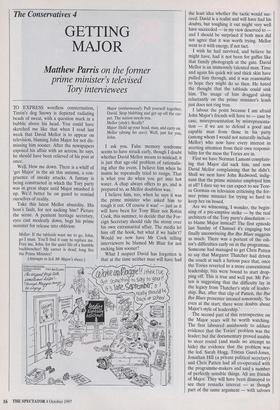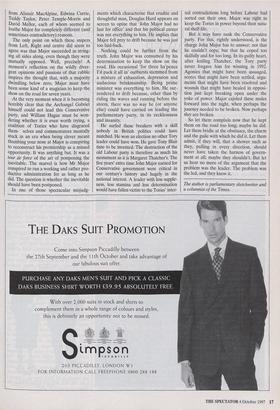The Conservatives 4
GETTING MAJOR
Matthew Parris on the former
prime minister's televised Tory interviewees
TO EXPRESS wordless consternation, Tintin's dog Snowy is depicted radiating beads of sweat, with a question mark in a bubble above his head. You could have sketched me like that when I read last week that David Mellor is to appear on television, blaming John Major for not dis- missing him sooner. After the newspapers exposed his affair with an actress, he says, he should have been relieved of his post at once.
Well, blow me down. There is a whiff of 'get Major' in the air this autumn, a con- gruence of sneaky attacks. A fantasy is being constructed in which the Tory party was in great shape until Major smashed it up. We'd better be on guard to remind ourselves of reality.
Take this latest Mellor absurdity. His boss's fault, for not sacking him? Picture the scene. A penitent heritage secretary, eyes cast modestly down, begs his prime minister for release into oblivion:
Mellor: If the tabloids want me to go, John, go I must. You'll find it easy to replace me. Free me, John, for the quiet life of a humble backbencher! My career is dead; long live the Prime Minister!
(Attempts to lick Mr Major's shoes.) Major (embarrassed): Pull yourself together, David. Stop blubbing and get up off the car- pet. The nation needs you.
Mellor (shy4,): Really?
Major Hold up your head, man, and carry on. Mellor (drying his eyes): Well, just for you, John.
I ask you. False memory syndrome seems to have struck early, though I doubt whether David Mellor means to mislead; it is just that age-old problem of rationalis- ing after the event. I believe him when he insists he repeatedly tried to resign. That is what you do when you get into hot water. A chap always offers to go, and is prepared to, as Mellor doubtless was. I believe him, too, when he says it was the prime minister who asked him to tough it out. Of course it was! — just as it will have been for Tony Blair not Robin Cook, this summer, to decide that the For- eign Secretary should ride the storm over his own extramarital affair. The media let him off the hook, but what if we hadn't? Would we now have Mr Cook telling interviewers he blamed Mr Blair for not sacking him sooner?
What I suspect David has forgotten is that at the time neither man will have had the least idea whether the tactic would suc- ceed. David is a realist and will have had his doubts, but toughing it out might very well have succeeded — in my view deserved to — and I should be surprised if both men did not agree that it was worth trying. Mellor went to it with energy, if not tact.
I wish he had survived, and believe he might have, had it not been for gaffes like that family photograph at the gate. David Mellor is an immensely talented man. Time and again his quick wit and thick skin have pulled him through, and it was reasonable to hope they might do so then. He hated the thought that the tabloids could sink him. The image of him dragged along reluctantly on the prime minister's leash just does not ring true.
I labour the point because I am afraid John Major's friends will have to — case by case, misrepresentation by misrepresenta- tion — if we are to defend a good and capable man from those in his party (among whom I would not naturally include Mellor) who now have every interest in averting attention from their own responsi- bility for the mess the Tories are in.
First we have Norman Lamont complain- ing that Major did sack him, and now David Mellor complaining that he didn't. Shall we next have John Redwood, indig- nant that the prime minister employed him at all? I dare say we can expect to see Tere- sa Gorman on television criticising the for- mer prime minister for trying so hard to keep her on board.
Are we witnessing, I wonder, the begin- ning of a pre-emptive strike — by the real architects of the Tory party's dissolution — to blame Major instead? The first episode last Sunday of Channel 4's engaging but finally unconvincing Bye Bye Blues suggests as much. There was a portent of the edi- tor's difficulties early on in the programme. Someone had managed to get Chris Patten to say that Margaret Thatcher had driven the coach at such a furious pace that, once the Tories reverted to a more conventional leadership, bits were bound to start drop- ping off. This is true and well put. Mr Pat- ten is suggesting that the difficulty lay in the legacy from Thatcher's style of leader- ship. But, after that clip of Patten, the Bye Bye Blues presenter intoned sonorously, 'So even at the start, there were doubts about Major's style of leadership.'
The second part of this retrospective on the Major years will be worth watching.
The first laboured assiduously to adduce evidence that the Tories' problem was the leader; but the documentary proved unable to steer round (and made no attempt to hide) the evidence that the problem was the led. Sarah Hogg, Tristan Garel-Jones, Jonathan Hill (a private political secretary) and Chris Patten had all co-operated with the programme-makers and said a number of perfectly sensible things. All are friends of Major. They will have been dismayed to see their remarks intercut — as though part of the same argument — with salvoes from Alistair MacAlpine, Edwina Currie, Teddy Taylor, Peter Temple-Morris and David Mellor, each of whom seemed to loathe Major for completely different (and sometimes contradictory) reasons.
The only point on which these snipers from Left, Right and centre did seem to agree was that Major succeeded in string- ing all sides along, even though they were mutually opposed. Well, precisely! A moment's reflection on the wildly diver- gent opinions and passions of that rabble inspires the thought that, with a majority dwindling below zero, Major must have been some kind of a magician to keep the show on the road for seven years.
At the very moment when it is becoming horribly clear that the Archangel Gabriel himself could not lead this Conservative party, and William Hague must be won- dering whether it is even worth trying, a coalition of Tories who have disgraced them- selves and commentators mentally stuck in an era when being clever meant thumbing your nose at Major is conspiring to reconstruct his premiership as a missed Opportunity. It was anything but. It was a tour de force of the art of postponing the inevitable. The marvel is how Mr Major conspired to run a working and rather pro- ductive administration for as long as he did. The question is whether the inevitable should have been postponed.
In one of those spectacular misjudg- ments which characterise that erudite and thoughtful man, Douglas Hurd appears on screen to opine that 'John Major had no lust for office' and that his political career was not everything to him. He implies that Major fell prey to drift because he was just too laid-back.
Nothing could be further from the truth. John Major was consumed by his determination to keep the show on the road. His occasional 'for three ha'pence I'd pack it all in' outbursts stemmed from a mixture of exhaustion, depression and audacious brinkmanship. Being prime minister was everything to him. He sur- rendered to drift because, other than by riding the waves and running before the storm, there was no way he (or anyone else) could have carried on leading the parliamentary party, in its recklessness and insanity.
He surfed these breakers with a skill nobody in British politics could have matched. He won an election no other Tory leader could have won. He gave Tony Blair time to be invented. The destruction of the old Labour party is therefore as much his monument as it is Margaret Thatcher's. The five years' extra time John Major earned for Conservative government were critical in our century's history and hugely in the national interest. A leader with less supple- ness, less stamina and less determination would have fallen victim to the Tories' inter- nal contradictions long before Labour had sorted out their own. Major was right to keep the Tories in power beyond their natu- ral shelf-life.
But it may have sunk the Conservative party. For this, rightly understood, is the charge John Major has to answer: not that he couldn't cope, but that he coped too skilfully and for too long. In its guilty heart, after knifing Thatcher, the Tory party never forgave him for winning in 1992. Agonies that might have been assuaged, scores that might have been settled, argu- ments that might have been resolved and wounds that might have healed in opposi- tion just kept breaking open under the yoke of power. Major cajoled these mules forward into the night, when perhaps the journey needed to be broken. Now perhaps they are broken.
So let them complain now that he kept them on the road too long; maybe he did. Let them bridle at the obstinacy, the charm and the guile with which he did it. Let them admit, if they will, that a shower such as they, pulling in every direction, should never have taken the harness of govern- ment at all; maybe they shouldn't. But let us hear no more of the argument that the problem was the leader. The problem was the led, and they know it.
The author is parliamentaty sketchwriter and a columnist of the Times.











































































 Previous page
Previous page